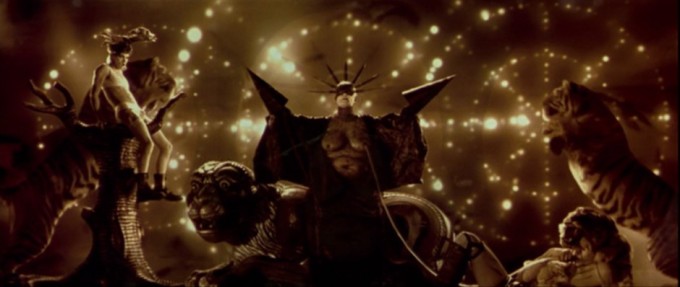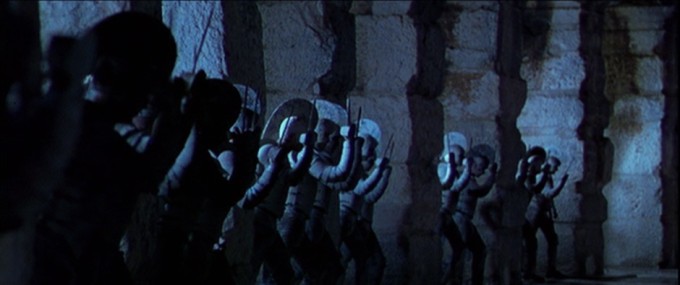Directed by Julie Taymor, 1999, 162 minutes
General Titus Andronicus (Anthony Hopkins) returns to Rome after forty years of campaigning. He parades his defeated foe Tamora, Queen of the Goths (Jessica Lange) and offers her first-born son in sacrifice. Refusing the role of Emperor Titus instead supports the coronation of Saturninus (Alan Cumming) who soon marries Tamora. Once Empress, Tamora enlists the help of her lover Aaron (Harry Lennix) and her surviving sons Chiron (Jonathan Rhys Meyers) and Demetrius (Matthew Rhys) in a plot to destroy Titus to avenge the death of her son.
Revenge tragedies, popularised by writers like Thomas Kyd and John Webster, were good box office in Elizabethan England and ‘Titus Andronicus’ (written 1588-1593) may have been Shakespeare’s first major hit. As fashions changed its frank portrayal of sex and violence set it aside from the rest of Shakespeare’s canon. Whilst ‘Macbeth’ may have gained an air of notoriety, ‘Titus’ acquired an additional taint of vulgarity. Considered too piquant for Victorian sensibilities the play was rehabilitated during the twentieth century following a series of successful theatrical interpretations. Innovative stage director Julie Taymor’s film captures the flamboyant tone of her acclaimed 1994 theatrical production, and she modifies Shakespeare’s text to reflect her passionate belief in the relevance of this play for modern audiences. Such changes may remain controversial, but this evolutionary process allows artistic work to survive and thrive in changing times; Shakespeare as playwright recognised the need to adapt his work to suit different audiences or political contexts.
‘Titus’ opens with an arresting prologue that provides a stylistic and thematic manifesto for what follows. Troops return to Rome in a meticulously choreographed triumph, mud-caked legions slow-march, stony-faced as statues; these veterans are literally battle-hardened, their stiff limbs recalling the toy soldiers that young Lucius (Osheen Jones) trashes in his war games at the breakfast table. Like Titus these unyielding, austere troops are tools of imperial power; their dogmatic rituals performed in obedience to an ailing state. Here and throughout Taymor works with production designer Dante Ferretti, costumer designer Milena Canonero and the studio craftsmen of Rome’s Cinecittà to create a design style that combines imperial Roman motifs with anachronistic elements of Mussolini’s 1930s fascist state. In this she reflects Shakespeare’s own approach, ‘Titus Andronicus’ eschews the chronicled specificity of his history plays and is closer to the symbolic landscapes of Ovid than the realpolitik of ‘Julius Caesar’. Some of the film’s crew worked with Pier Paolo Pasolini and Federico Fellini and the film is a blend of ‘Salò, or the 120 Days of Sodom’ (1975) and ‘Fellini Satyricon’ (1969). Eclectic design lends the film an immediacy that would have been lost by setting the film in a ‘realistic’ Ancient Rome and allows Taymor greater freedom to explore the plays’ themes and imagery. Digital effects enhance the film like illuminated panels in a mediaeval manuscript. These interludes, inspired by the transgressive art of Joel Peter Witkin echo the internal world of the protagonists, and provide a digital Greek chorus to heighten drama. Taymor’s magpie approach to design is complemented by Elliot Goldenthal’s eclectic score which mixes strident brass, full orchestra with carnival tunes, jazz rhythms and grunge rock.

Shakespeare’s poetry in ‘Titus Andronicus’ is often direct, almost vulgar in keeping with the forthright style of revenge tragedy, but the play also contains some speeches of immense beauty. Anthony Hopkins manages the steady crescendo of the soliloquies perfectly, holding back his energy to unleash a devastating climax. The cast adjust Shakespeare’s iambic rhythms to reflect theme and action: Titus invites tragedy by his unquestioning loyalty to the state and rigid obedience to laws of succession, the play begins with clipped, rhythmic dialogue which suggests that Titus and his family are bound by strict codes of duty that repress emotional display. As tragedy unfolds the rhythms warp and shift to reflect an inner turmoil that can no longer be constrained by social discipline. Lavinia (Laura Fraser) must find a new language to express her torment; she discovers a profound level of communication with her father that goes beyond the formal courtesies of filial obedience. Anthony Hopkins and Laura Fraser portray this poignant relationship beautifully in scenes that foreshadow Lear and Cordelia. Elsewhere the imagery reflects the tumult of the natural world: Rome becomes a ‘wilderness of tigers’ and the tigress a motif for Tamora’s maternal savagery in her unrelenting pursuit of revenge.; Titus’ tears water the barren earth in vain and challenge the stormy skies with rage and grief. Characters frequently compare themselves to figures in classical mythology: Lavinia’s fate mirrors that of Philomel in Ovid’s ‘Metamorphoses’ and Tamora appears as a Fury, one of the avenging goddesses of myth.
The violence of revenge tragedy achieves a heightened sense of catharsis by the spectacle of savagery. Taymor chooses a more ambivalent approach and deploys some disturbingly ambivalent imagery: Lavinia’s torment is presented aesthetically rather than realistically but remains particularly harrowing. Elsewhere Taymor exaggerates the cartoon excess of revenge tragedy to dislocate the viewer’s emotional response: Titus grins with glee as he savours his revenge, and the viewer guiltily shares the metaphorical wit and poetic justice of his actions. When Titus loses his hand as part of a sadistic practical joke Aaron cheerfully zips the severed appendage into a polythene freezer bag, presenting mutilation as farce. Tragedy constantly threatens to tip into hysteria as ‘Titus’ repeatedly provokes the viewer into considering their own reactions to violent entertainment. The bullet time finale may look dated but for audiences in 1999 this was a witty nod to the balletic action of ‘The Matrix’ (The Wachowskis, 1999), a film accused of glamourizing gunplay. The violence of ‘Titus Andronicus’ may have provoked a very different response in the days when London Bridge displayed severed heads as an eloquent reminder of the state power. For modern viewers Taymor holds up a distorted mirror to a world where brute force and deceit remain standard means of political control. Although the film ends with the faintest suggestion of future redemption both Shakespeare and Taymor remain pragmatically ambivalent about the prospect of hope.
Twenty-first century viewers may have more problems with inherent racism and sexism in ‘Titus’ than the stylised violence. Taymor employs careful casting to tackle the tension between sixteenth century prejudice and twenty first century portrayals of race and gender. The evil moor is a stock figure in Elizabethan drama and Aaron’s confession speech offers a glimpse of how Shakespeare’s contemporaries would have perceived this character. Harry Lennix made the role of Aaron his own on stage and his sophisticated interpretation subverts stereotype, adding complexity to this character. He realises that Aaron is the cleverest and most alluring character in the play, savours the irony of racist taunts and gives lines like ‘is black so base a hue?’ added significance. Aaron’s eloquent self-confidence and his fierce love for his child help the viewer to regard him sympathetically despite Shakespeare’s best efforts to portray him as a devil. Jessica Lange plays Tamora as a clever politician and powerful negotiator who uses her wits as well as her sexuality to rise to a position of power in the Roman Empire. She brings a passionate gravitas to Tamora emphasising her role as a wronged woman twisted by grief into a monstrous perversion of maternal instinct.

Anthony Hopkins remains remarkably pragmatic and understated about his abilities as an actor, but this is his finest screen performance. The audience meets Titus as an impervious masculine presence. We are unable to understand this monstrous father who is willing to sacrifice his own sons in blind obedience to the state. Gradually we see this unbending martinet reduced by his grief to a raving old man naked in his bathtub. The viewer sympathises with this proud man brought low, scrawling pictures of his foes in his own blood and fastening them to the wall with spit. As in ‘Hamlet’ the issue of Titus’ madness or sanity is a plot device and Hopkins keeps the audience in a constant state of tension, sometimes giddily insane but capable of switching to steely rationality in an instant. He even manages to throw in a trademark Hannibal Lecter moment which offers the audience a wry chuckle.
The seeds of Shakespeare’s greatest tragedies are sown in ‘Titus Andronicus’. The device of feigned madness to achieve revenge is perfected in ‘Hamlet’ (1599-1601), the destruction of a proud man recurs in ‘King Lear’ (1603-1606). These tragedies foreshadow the inward gaze of nineteenth and twentieth century theatre with their mental and spiritual self-awareness whilst looking back to the tragedies of the Greek tradition with their archetypes of rage and grief whose physical wounding reflects the sufferings of the soul. It is ironic that the revenge tragedy, a theatrical form perceived as crude for so long would ultimately evolve into the complex characterisations of Chekov and Beckett. ‘Titus’ is a bold and accessible rediscovery of one of Shakespeare’s formative works. Taymor’s sumptuous visual style rewards repeated viewings and captures the all the primal vigour of revenge tragedy on stage.
Quotes
“I’ll find a day to massacre them all” Tamora (Jessica Lange)
“Oh earth, I will befriend thee more with rain, that shall distil from these two ancient urns, than youthful April shall with all his showers: In summer’s drought I’ll drop upon thee still; In winter with warm tears I’ll melt the snow and keep eternal spring-time on thy face, so thou refuse to drink my dear sons’ blood.” Titus Andronicus (Anthony Hopkins)
Connections
Film and Television
‘Fellini Satyricon’ directed by Federico Fellini (1968)
‘The Cook, the Thief, his Wife and her Lover’ directed by Peter Greenaway (1989)
‘Richard III’ directed by Richard Loncraine (1995)
‘Hamlet’ directed by Kenneth Branagh (1996)
‘Revenger’s Tragedy’ directed by Alex Cox (2003)
‘Coriolanus’ directed by Ralph Fiennes (2010)
Radio

You must be logged in to post a comment.